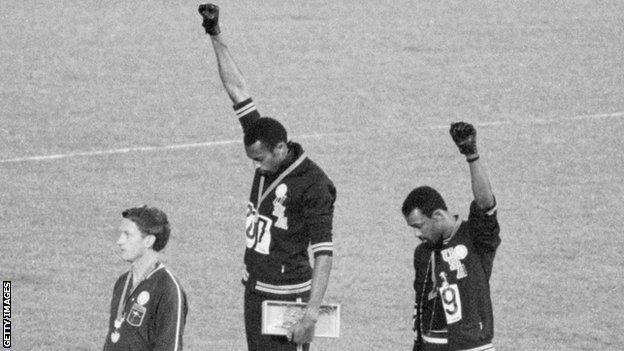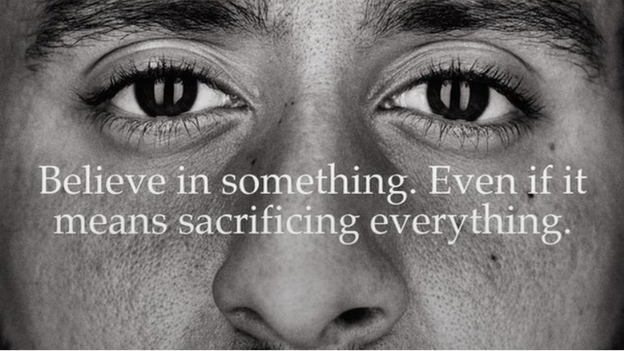Colin Kaepernick's NFL protest made Black Power salute athlete Tommie Smith cry
- Published
50 years since Black Power salute but has anything changed?
Tommie Smith, famous for his Black Power salute at the 1968 Olympics, says he cried when fellow American Colin Kaepernick protested against racial injustice and police brutality.
NFL quarterback Kaepernick protested by kneeling during the US national anthem, and other players soon followed.
However the gesture also proved divisive, with some critics claiming it was unpatriotic.
Smith told BBC Sport he took "glorious pride" from the gesture.
Kaepernick's kneeling - which started in August 2016 - even sparked President Donald Trump's anger, and he called for players who "disrespect" the US flag to be sacked.
Who is Tommie Smith?

Smith (centre) and John Carlos made a black power salute on the podium at the 1968 Olympic Games
It is 50 years since Smith and fellow 200m runner John Carlos made the Black Power salute in Mexico City on 17 October 1968.
Gold medallist Smith and Carlos - who finished third - made the gesture, each wearing one black glove, during their medal ceremony in order to support the civil rights cause. The gesture was made to highlight racial injustice at a time of social unrest in the United States - the black civil rights activist Martin Luther King had been assassinated just months earlier.
The pair were sent home from the 1968 Games, suspended from the US track team and received death threats.
Smith on Kaepernick
When asked whether Kaepernick's actions meant nothing had really changed in the 50 years since his own silent but powerful protest, Smith said: "You think Colin would have done that if something hadn't happened before to give him the idea there was a need to be change? He used what he had to try to make that change because of the atrocities that were happening.
"He had a position - being one of the best quarterbacks and being a young, black athlete making this stand, making this political stand. But do you know how many stands like Tommie Smith and John Carlos or Colin Kaepernick were done but not noticed? Do you know how many times Colin took the knee before he was recognised?"
He said he applauded Kaepernick for his action and leading a new movement to highlight racial injustices. And he added: "I cried also. He's young and he gave up hope of something that was very sacrificial to him because he loved football, still loves football, I think Colin will always love football.
"I sacrificed my career and people are going to have to sacrifice behind Colin too - we don't stop because the glass is half-empty. It will improve because we'll fight to fill it up."
What is Kaepernick doing now?

Kaepernick was chosen by Nike as the face of a new advertising campaign
Kaepernick, who has received Amnesty International's highest honour, has been without a team since he opted out of his contract with the San Francisco 49ers in March 2017.
He has filed a grievance against NFL team owners he claims conspired not to hire him because of his protests, and it has been ruled that case can go to trial.
Sports company Nike has chosen Kaepernick as the face of an advertising campaign with the slogan: "Believe in something. Even if it means sacrificing everything."
Critics encouraged people to destroy Nike goods in protest at the use of Kaepernick, but there are signs the firm's sales appear to have increased.